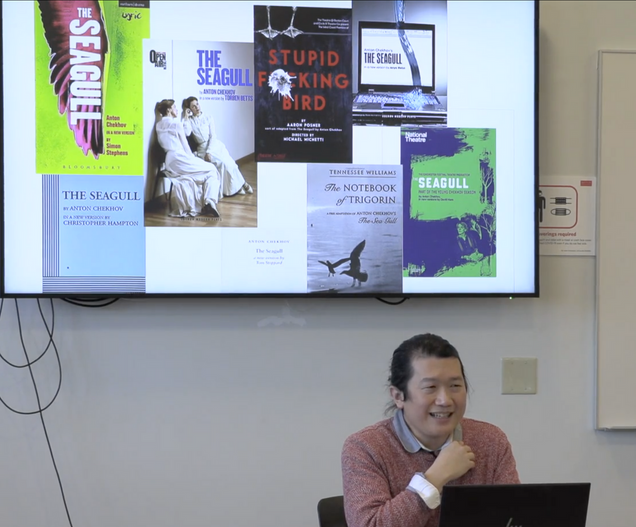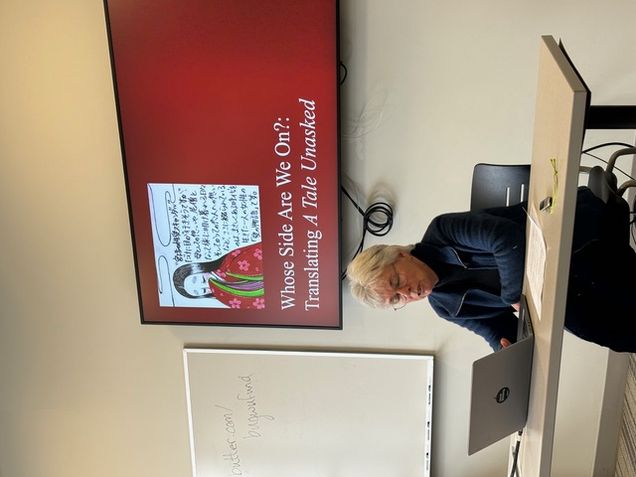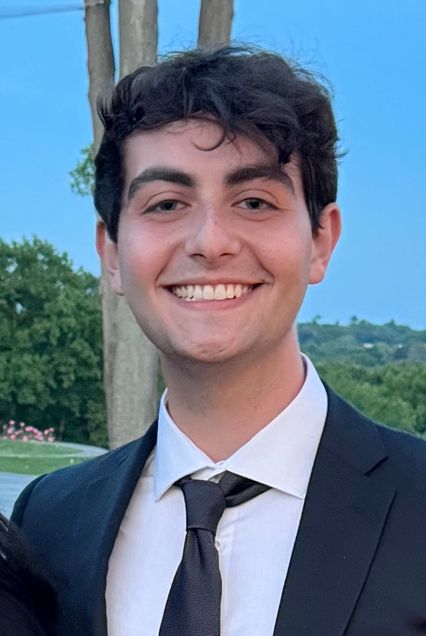Found in Translation
Candidates for the MFA in Literary Translation learn how to interpret the world’s great works of writing
Emergency BU Alert BU Alert: Winter Weather Closure Update – Campuses Remain Closed 2/24/26, Reopening 2/25/26 Due the continued effects of the blizzard, including limited transportation infrastructure and power outages throughout the state, Boston University’s Charles River, Fenway, and Medical Campuses will remain closed on Tuesday, February 24, with limited services being offered. The University will resume normal operations and reopen all campuses on Wednesday, February 25. For more info, please visit bu.edu/today.
Candidates for the MFA in Literary Translation learn how to interpret the world’s great works of writing
Translating a literary work from one language to another starts with a close reading of a text. Motoyuki Shibata, a Japanese translator of American literature, defines literary translation as “a report on how much I liked the book.” Anna Zielinska-Elliott started her first translation after reading Haruki Murakami’s novel A Wild Sheep Chase in Japanese and wanting it to be available to read in her native Polish.
“You’re reading a book in a foreign language, and you think, ‘This is a really cool book. I want my friends or my mom to read it,’” says Zielinska-Elliott, a master lecturer in Japanese. “Then you start hearing it in your head translated, and you get this urge to translate it.”

Zielinska-Elliott also directs BU’s MFA in Literary Translation, an intensive, one-year program in the art of translation. The program is administered by the Department of World Languages & Literatures and draws faculty from the departments of classical studies, romance studies, English, and creative writing—all of whom are themselves professional translators. Though the MFA was only launched in 2019, BU enjoys a rich legacy of literary translation work and instruction, going back to the late 1970s.
For her part, Zielinska-Elliott has translated many Japanese works—including 12 Murakami novels and several short story collections and essays—into Polish over the last three decades. She cites two primary methods of translation: one is to create a rough draft of a translation and go back to look up words and fix the mistakes; and the second, which she employs, is to create a near-final translation in one draft, looking up unfamiliar words as she goes.
Balancing her translation work with being a professor and running an MFA program can be hard, and Zielinska-Elliott says she translates during every free moment she has—completing up to 15 pages a day of the original work. She says the best translators are good writers in their native tongue who understand that they’re not translating words, but rather translating what the words mean.
“I think everybody can learn the techniques of translation, to a degree,” she says. “If you don’t love language, if you don’t enjoy this process, then you probably will never become really, really good.”
The origin story of BU’s MFA in Literary Translation goes back more than 40 years to a classroom in BU’s School of Theology. That’s where, beginning in 1978, the late Rodolfo Cardona, a professor of foreign language, first invited a small group of academic colleagues and students for a Friday afternoon discussion of the art of translating literature. These informal chats became formal in 1982 when Cardona used part of a $3 million Andrew W. Mellon Foundation grant to launch—with Rosanna Warren, the former Emma MacLachlan Metcalf Professor of the Humanities, University Professor, and professor of English and romance studies—the BU Translation Seminar: a weekly speaker series open both to the public and to graduate students seeking course credit.

The seminars attracted a who’s who of literary types from even beyond the translation world, including Nobel Prize-winning writers Joseph Brodsky and Seamus Heaney. Over the next 30 years, the seminar took shape under the leadership of Warren, a beloved American poet and translator in her own right, until she accepted an appointment at the University of Chicago in 2012. By all accounts, it was a literary translation community that punched way above its weight. The addition of an MFA in Literary Translation in 2019 took it to the next level.
The one-year MFA welcomes up to six students each fall and is taught by faculty from the Departments of World Languages & Literature, Romance Studies, Classical Studies, English, and Creative Writing. Students take courses that include translation history and theory, language-specific workshops, and advanced literary study, then work closely with faculty mentors to produce a publishable translation of a text of their choosing as their capstone project. Zielinska-Elliott believes the program’s strength comes from the deep well of BU faculty who have translated works of literature or written on translation: a database of translations and scholarship on translation by current BU faculty includes more than 200 works.
“We only accept students in languages in which we have a faculty member who either is a translator of that language or knows a lot about translation and is able to work with a student one on one,” Zielinska-Elliott says. “That makes us very different from other programs, which accept students in any language. We feel very strongly that while the most important part of translation is the final product, so there also needs to be a process where somebody makes sure the student is actually translating the text, and that they are getting all the nuances and understanding of what’s going on.”

It’s those nuances that Zielinska-Elliott thinks will protect translators from the threat of artificial intelligence, or AI. She encourages students in her undergraduate Japanese translation class to use AI tools like Google Translate and chatbots to check their own work for some assignments—even if she discourages it in her master’s students’ translations and avoids it in her own work so as not to mute their hearing of the author’s voice. But professional translators shouldn’t fear being replaced by robots just yet, she says. Since 2015, she’s pasted the first paragraph of Yasunari Kawabata’s Snow Country into an AI translator (first Google Translate and now DeepL Translate) to test its accuracy with one of her classes.
“I’m happy to say that it still can’t do it,” she says. “It’s gotten better, but it still cannot do what a human could do yet.”
Why?
“[AI] doesn’t have taste,” she says. “It has a hard time judging the beauty of a sentence. So until it learns to differentiate that and has some aesthetic sense, the translation will still need a human.”
Evan Laufman (CAS’24, GRS’25) became enamored of translation while pursuing his bachelor of arts in Japanese language and literature, when he took Zielinska-Elliott’s Japanese translation class his third year. Laufman started translating stories and manga—Japanese comics—in his spare time, even winning the Han Suyin Literary Prize in 2023 for his translation of Motoyuki Shibata’s short story, “Valentine.” Entering the MFA program in translation after graduation was a natural next step.

“The idea of studying a more niche field like translation so closely was very enticing,” Laufman says. “In the few months leading up to the program, I found myself getting increasingly excited to learn about translation theory and literary style; I couldn’t wait to see how my studies would impact my thought process as a translator, and how that impact would be visible in my work.”
Laufman says he hopes to continue translating Japanese anime, manga, and novels into English and plans to apply for the Japanese Exchange and Teaching Program, which would allow him to work in Japan as a translator and interpreter.
“The MFA is led by a group of professors who have a real passion for translation, and every day I study in this program, that passion is palpable,” Laufman says. “I get a variety of different perspectives, theories, and opinions regarding translation that have all been gradually coalescing to progress my own translation style. The program shines in its personalization; each student gets significant one-on-one time and individualized feedback that help them grow as scholars, writers, and translators.”